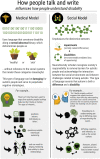Avoiding Ableist Language: Suggestions for Autism Researchers
- PMID: 36601265
- PMCID: PMC8992888
- DOI: 10.1089/aut.2020.0014
Avoiding Ableist Language: Suggestions for Autism Researchers
Abstract
In this commentary, we describe how language used to communicate about autism within much of autism research can reflect and perpetuate ableist ideologies (i.e., beliefs and practices that discriminate against people with disabilities), whether or not researchers intend to have such effects. Drawing largely from autistic scholarship on this subject, along with research and theory from disability studies and discourse analysis, we define ableism and its realization in linguistic practices, provide a historical overview of ableist language used to describe autism, and review calls from autistic researchers and laypeople to adopt alternative ways of speaking and writing. Finally, we provide several specific avenues to aid autism researchers in reflecting on and adjusting their language choices.
Lay summary: Why is this topic important?: In the past, autism research has mostly been conducted by nonautistic people, and researchers have described autism as something bad that should be fixed. Describing autism in this way has negative effects on how society views and treats autistic people and may even negatively affect how autistic people view themselves. Despite recent positive changes in how researchers write and speak about autism, "ableist" language is still used. Ableist language refers to language that assumes disabled people are inferior to nondisabled people.What is the purpose of this article?: We wrote this article to describe how ableism influences the way autism is often described in research. We also give autism researchers strategies for avoiding ableist language in their future work.What is the perspective of the authors?: We believe that ableism is a "system of discrimination," which means that it influences how people talk about and perceive autism whether or not they are aware of it, and regardless of whether or not they actually believe that autistic people are inferior to nonautistic people. We also believe that language choices are part of what perpetuates this system. Because of this, researchers need to take special care to determine whether their language choices reflect ableism and take steps to use language that is not ableist.What is already known about this topic?: Autistic adults (including researchers and nonresearchers) have been writing and speaking about ableist language for several decades, but nonautistic autism researchers may not be aware of this work. We have compiled this material and summarized it for autism researchers.What do the authors recommend?: We recommend that researchers understand what ableism is, reflect on the language they use in their written and spoken work, and use nonableist language alternatives to describe autism and autistic people. For example, many autistic people find terms such as "special interests" and "special needs" patronizing; these terms could be replaced with "focused interests" and descriptions of autistic people's specific needs. Medicalized/deficit language such as "at risk for autism" should be replaced by more neutral terms such as "increased likelihood of autism." Finally, ways of speaking about autism that are not restricted to particular terms but still contribute to marginalization, such as discussion about the "economic burden of autism," should be replaced with discourses that center the impacts of social arrangements on autistic people.How will these recommendations help autistic people now or in the future?: Language is a powerful means for shaping how people view autism. If researchers take steps to avoid ableist language, researchers, service providers, and society at large may become more accepting and accommodating of autistic people.
Keywords: ableism; ableist discourse; autism; language; neurodiversity.
© Kristen Bottema-Beutel et al., 2021; Published by Mary Ann Liebert, Inc.
Conflict of interest statement
No competing financial interests exist.
Figures
References
-
- Smith L. #Ableism. Center for Disability Rights. n.d. http://cdrnys.org/blog/uncategorized/ableism (accessed April 26, 2020).
-
- Botha M, Frost DM. Extending the minority stress model to understand mental health problems experienced by the autistic population. Soci Mental Health. 2020;10(1):20–34.
-
- Bottema-Beutel K, Cuda J, Kim SY, Crowley S, Scanlon D. High school experiences and support recommendations of autistic youth. J Autism Dev Disord. 2019;1–16. - PubMed
-
- Johnson TD, Joshi A. Dark clouds or silver linings? A stigma threat perspective on the implications of an autism diagnosis for workplace well-being. J Appl Psychol. 2016;101(3):430. - PubMed
LinkOut - more resources
Full Text Sources
Research Materials
Miscellaneous

